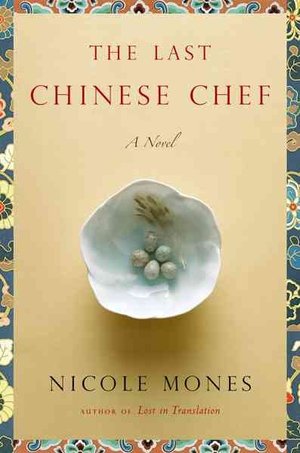How do you distill the culinary
essence of 5000 years of history into a single short book?
The Last Chinese Chef is one of those books where even if you don't know a thing about the subject matter to start, you will by the end. Moreso, you'll likely be grateful for it. The more you know to start with though, the better you'll probably like it. I'm definitely a fan of this approach, which the book handles well- I would recommend it to anyone who has a care for the relationship between food and culture, food and family, or food and more food! In that way it's a lot like a Fuschia Dunlop book, which makes perfect sense given both the subject matter and the intended perspectives.
Written by Nicole Mones, who also penned Lost In
Translation (you may have seen the movie adaptation, and if not you should- it's not the easiest watch but Bill Murray gives a truly inspired
performance), it weaves the story of a food writer and a great chef into an
already bright tapestry of Chinese literature, art, culture, and food.
Much of the main story is outlined by parables and Chinese idioms which serve to flesh out the story, making it seem a liiiittle less thin than it would otherwise read. While I noticed, knowing full well who this book was marketed at, not everyone will notice or even care. There are a fair number of interesting coincidences in the book too, but that's just... sort of how literature works in settings like Hong Kong, Taiwan, and China anyway. It's really hard to break out of that whole 'Asian Mystique' trope, I've found.
This manuscript also bears a lot of underlying resemblance to
Jennifer Lee's "The Fortune Cookie Chronicles", which I'll post a review for sometime this week. Not in execution of
course, but rather in intent. Serving not only to educate, but to illuminate and
fascinate the reader. It reveals answers to questions you might not know you had, and subtly
brings out the desire to explore further even as it does.
There's one fairly robust caveat to the book though. It was published in 2007, and the story's then too- in the period leading up to the 2008 Beijing Olympic Games. Using that context, the story fits superbly- the journey of a chef alongside the journey of his homeland, both seeking greatness, belonging, and approval as what they were and what they strive to be. The deliberate time and place setting serves to highlight the past, analyze the present, and inspire hope for things yet to come. It was a superbly chosen parallel at the time, but looking at it now? The messages ring hollow indeed.
In spite of that one bit of bother, this book is well
worth a read. It might be indirect in its messages, but they could never be called vague.
Chinese style, by a non-Chinese.
And that's the point, really. Read it- you'll see what I mean.



No comments:
Post a Comment